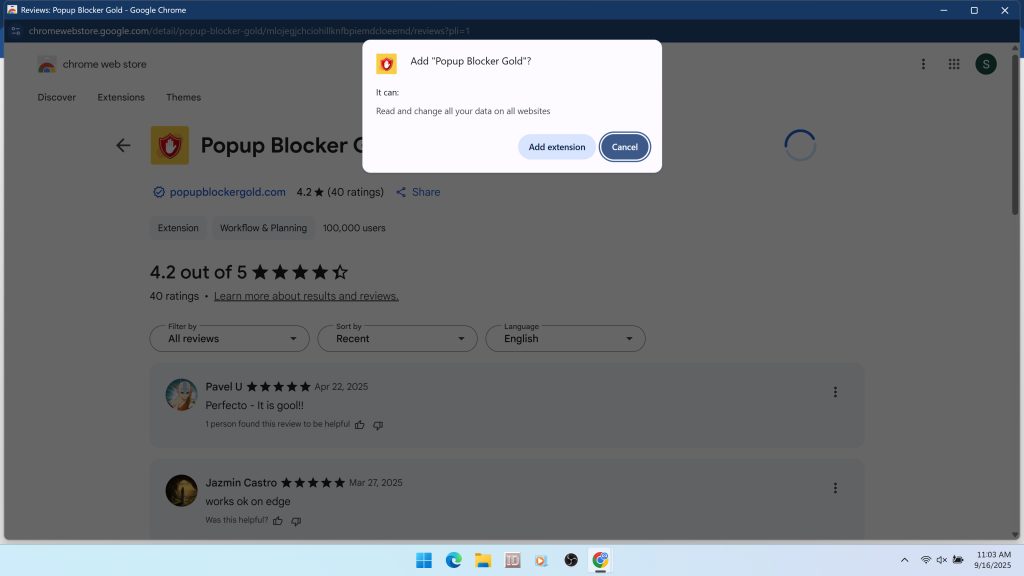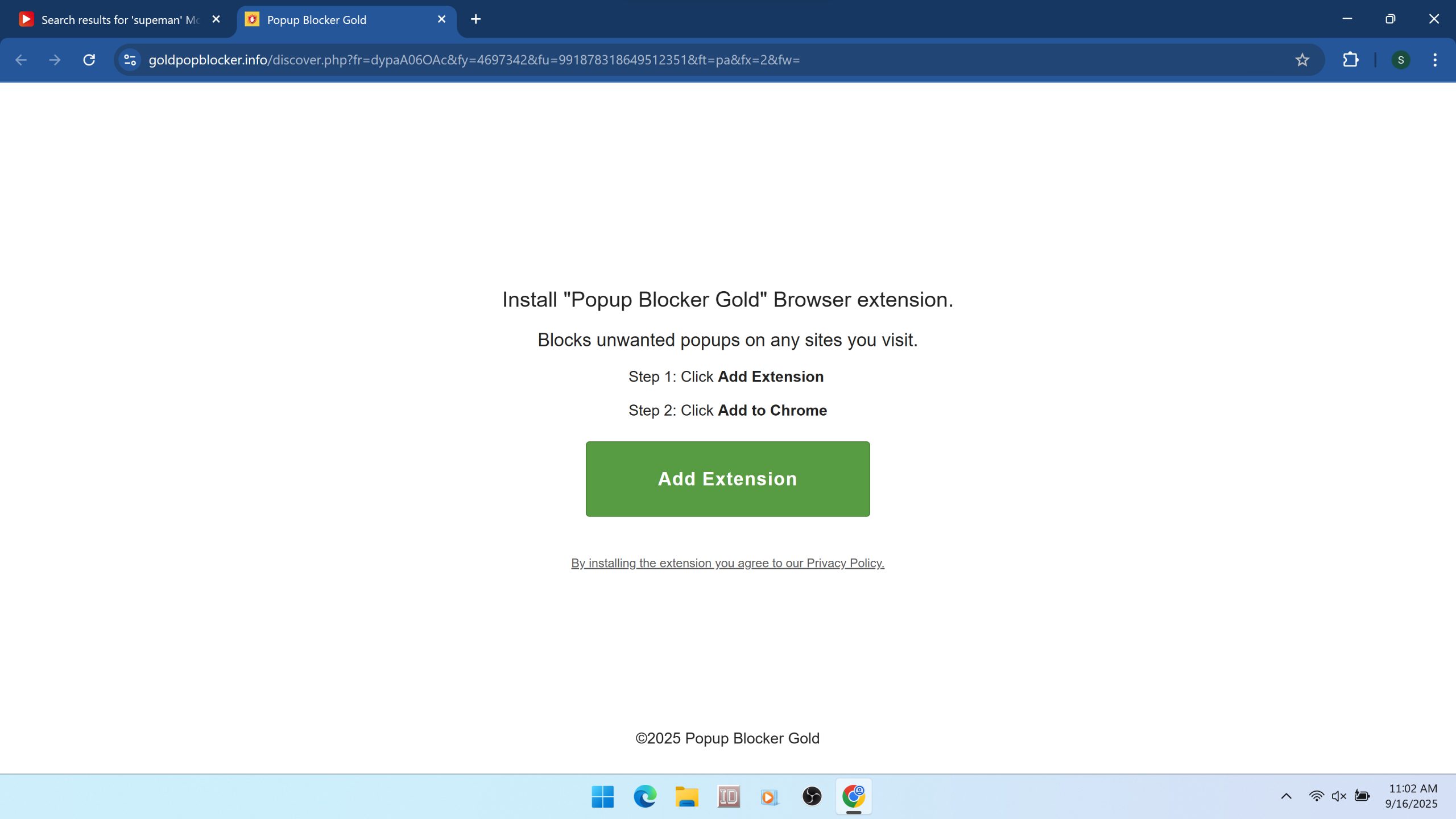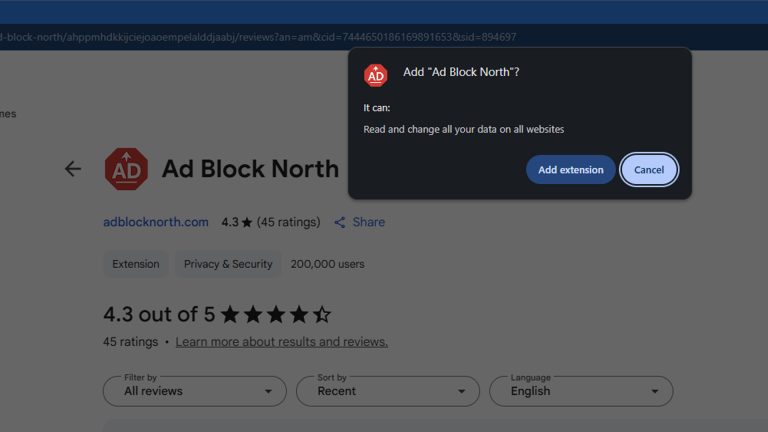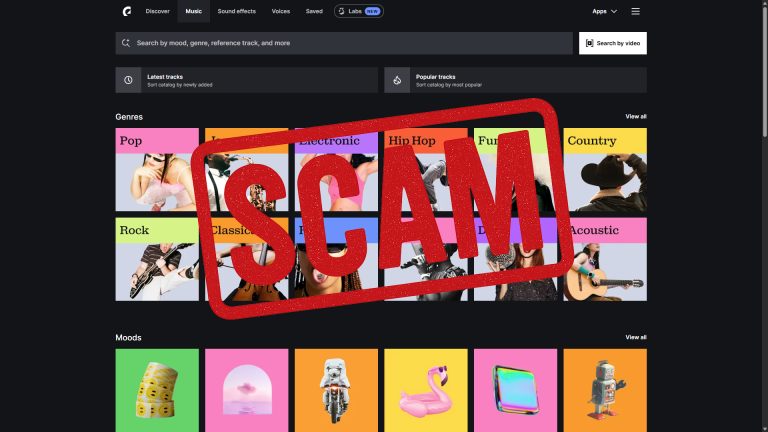Popup Blocker Gold is a suspicious Chrome extension that markets itself as a solution for blocking popups and intrusive ads. While the name may sound legitimate, this extension has raised significant concerns in the security community because of how it is promoted, the permissions it requires, and the advertising networks it is tied to. It is often installed through full-page ads, aggressive popups, and misleading prompts that appear on unsafe websites. In some cases, users report finding it installed without their clear consent, which is a red flag for any browser extension. Because of its behavior, many people refer to it as the Popup Blocker Gold virus.

Extensions like this walk a dangerous line. On the surface, they may block some ads, giving the appearance that they work as promised. However, behind the scenes, the risks far outweigh the benefits. Popup Blocker Gold requires invasive permissions such as the ability to “Read and change all your data on the websites you visit”. This permission alone gives it access to everything you do online, including browsing history, searches, and even sensitive information you enter into forms. Combined with the fact that it is distributed through networks that also promote malware, potentially unwanted programs (PUPs), and scams, the extension is considered unsafe and untrustworthy.
In this guide, we will break down what Popup Blocker Gold is, why it is unsafe, how users typically encounter it, and the risks tied to its installation. We will also provide step-by-step instructions to manually remove it from Chrome and other browsers, uninstall related programs from Windows, and run a full system scan with Anti-Malware software like Malwarebytes to ensure your system is completely clean.
Why Security Professionals Warn About Popup Blocker Gold
Popup Blocker Gold is flagged by researchers because it combines several warning signs that define unsafe browser extensions. The first concern is the way it is promoted. Safe extensions are usually discovered through the official Chrome Web Store, user recommendations, or open-source projects. Popup Blocker Gold, on the other hand, is distributed through full-page advertisements, aggressive popups, and deceptive landing pages. These ads appear on torrent sites, free streaming portals, and adult websites where legitimate ad networks do not operate. This type of promotion is a hallmark of low-quality or outright malicious extensions.
The second concern is the permissions requested by Popup Blocker Gold. By asking for the ability to read and change all data on every website, the extension gains the power to monitor everything you do online. It can capture login credentials, modify search results, inject additional advertisements, and redirect traffic. While not every extension that requests broad permissions is malicious, the combination of aggressive advertising and invasive permissions is a strong indicator of risk.
The third concern is how Popup Blocker Gold may install without explicit consent. Reports indicate that some users encounter installation prompts disguised as updates, downloads, or security checks. In some cases, bundled installers include the extension as part of the package, leaving users with an unwanted add-on they did not intentionally approve. These tactics violate the principle of informed consent and make the extension highly untrustworthy.
Finally, the biggest red flag is that Popup Blocker Gold is connected to ad networks that distribute not only intrusive ads but also malware, PUPs, and scams. If an extension relies on the same networks that push fake antivirus alerts, fraudulent subscription offers, and rogue installers, it cannot be considered safe. The ecosystem around Popup Blocker Gold is inherently hostile to users and geared toward monetizing traffic at any cost.
WHOIS and Domain Age Information
Public WHOIS records for popupblockergold.com reveal that the domain was created on December 5, 2022 and is currently registered with Cloudflare, Inc.. The domain status is listed as clientTransferProhibited and renewperiod, which is standard for an active registration. The domain is set to expire on December 5, 2025. All registrant details have been redacted for privacy, which is common for questionable extensions because it prevents the public from tracing ownership back to a real company or individual.
popupblockergold.com at a glance:
Created: 2022-12-05 • Expires: 2025-12-05
Registrar: Cloudflare, Inc. • Status: clientTransferProhibited, renewperiod
Registrant: Redacted for privacy • Nameservers: adel.ns.cloudflare.com, norm.ns.cloudflare.com
The short lifespan of the domain and the fact that ownership is hidden behind privacy protection are classic signs of domains that may be part of a larger network. Legitimate businesses often display clear ownership information to build trust with users. In contrast, domains tied to suspicious extensions rely on concealment. This allows operators to abandon the domain quickly if it is flagged and then rebrand under a new name.
You can verify domain details for yourself using our WHOIS Lookup tool and check how long a site has been active with our Domain Age Checker. These tools are useful for spotting suspicious domains and avoiding unsafe downloads.
Hosting Information
Hosting records show that popupblockergold.com resolves to the IP address 172.67.204.233, which is part of Cloudflare’s infrastructure. Cloudflare is one of the largest content delivery and protection networks in the world, and while it is widely used by legitimate companies, it is also popular with shady operators because it hides the true origin server. When a domain uses Cloudflare, the underlying hosting provider is masked, making it more difficult to trace the actual operator of the website.
This does not mean Cloudflare itself is malicious. However, the fact that Popup Blocker Gold relies on Cloudflare makes sense for an extension that does not want to be easily tracked or shut down. By hiding behind Cloudflare’s network, the operators gain an additional layer of anonymity and resilience. If the site is reported, the real server remains protected from public view, allowing them to move the domain or continue operations with minimal disruption.
If you want to investigate hosting details for other domains, you can use our Website Host Search tool. This tool allows you to see where a site is hosted and whether it shares infrastructure with other suspicious websites.
How Users Encounter Popup Blocker Gold
Users typically encounter Popup Blocker Gold through aggressive advertising networks that specialize in monetizing risky traffic. The extension is promoted on free streaming sites, torrent indexes, file-hosting mirrors, and adult portals where legitimate advertisers will not operate. When a user clicks a play button, a download link, or even just navigates through the page, a full-page ad may appear claiming that their browser requires Popup Blocker Gold to block popups. In other cases, deceptive prompts may appear that resemble software updates or security checks, tricking users into installing the extension.
Another way users encounter Popup Blocker Gold is through bundling. Some free software installers include the extension as an optional component, but the option may be pre-checked or hidden in the installation process. This results in users installing the extension without fully realizing what they agreed to. In both scenarios, the lack of informed consent makes the installation deceptive.
Here is a typical scenario: A user visits a free movie streaming site. The page displays several play buttons, but only one is real. Clicking one of the fake buttons opens a new tab that leads to a full-page ad for Popup Blocker Gold. The page claims that the user must install the extension to continue watching. Trusting the message, the user clicks install, granting the extension broad permissions. From that point on, their browser is compromised by an add-on they never truly wanted.
How Popup Blocker Gold Works
Popup Blocker Gold presents itself as a tool for blocking intrusive ads, but the way it operates raises major concerns. While it may block some popups, it also injects its own advertising, redirects traffic, and monitors user behavior. The invasive permissions it requests allow it to read and change data across all websites, which means it can access everything from browsing history to personal information entered in online forms.
Unlike reputable ad blockers such as uBlock Origin or AdGuard, Popup Blocker Gold is not open-source, does not have a transparent community of developers, and does not provide users with control over what is blocked. Instead, it appears to be part of a closed system designed to profit from user data and advertising manipulation. The extension may replace legitimate ads with its own, redirect users through affiliate links, or push additional downloads. These behaviors undermine the very purpose of an ad blocker and demonstrate that the extension is not trustworthy.
Risks of the Popup Blocker Gold Virus Pattern
The risks associated with Popup Blocker Gold are extensive and should not be underestimated. They include:
- Adware injection: The extension can inject its own ads into websites, replacing or adding to existing content. This not only clutters your browsing experience but also exposes you to ads from unverified sources that may lead to scams or malware.
- Data harvesting: With permission to read and change all data on websites, the extension can log searches, monitor browsing habits, and even capture login details. This data may be sold to third parties or used to deliver targeted scams.
- Browser hijacking: Popup Blocker Gold may modify your search engine, homepage, and new tab settings. This forces you to use monetized platforms that generate revenue for the operators at your expense.
- Redirect chains: The extension can send you through multiple redirects that lead to subscription scams, fake antivirus pages, or phishing portals. Each redirect increases the risk of encountering more malicious content.
- Malware payloads: While not every redirect or download results in malware, the networks tied to Popup Blocker Gold are known for delivering trojans, ransomware, and other serious threats. Even if today’s payload is a harmless installer, tomorrow’s could be much worse.
Security professionals emphasize that even if Popup Blocker Gold appears to work, the underlying risks far outweigh any benefits. The extension is essentially a Trojan horse, disguising itself as a useful tool while exposing users to a hostile advertising ecosystem.
Manual Removal Steps
If you suspect that Popup Blocker Gold is installed on your browser, you should remove it immediately. Here are detailed steps to uninstall the extension and clean your system:
Remove Popup Blocker Gold from Chrome
- Open Chrome and click the three-dot menu in the top right corner.
- Select Extensions > Manage extensions.
- Look for Popup Blocker Gold in the list of installed extensions.
- Click Remove and confirm.
Remove from Edge
- Open Edge and click the three-dot menu.
- Select Extensions.
- Find Popup Blocker Gold and click Remove.
Remove from Firefox
- Click the menu button and select Add-ons and themes.
- Go to Extensions.
- Locate Popup Blocker Gold and click Remove.
Clear browsing data and reset settings
- In Chrome, go to Settings > Privacy and security > Clear browsing data.
- Select Cookies and other site data and Cached images and files. Clear data for the last 7 days or longer.
- Return to Settings, check Search engine and On startup, and remove any unfamiliar entries.
- If issues persist, reset Chrome by going to Settings > Reset settings > Restore settings to their original defaults.
Uninstall unwanted programs on Windows
- Right click the Start button and select Apps and Features (Windows 10) or Installed apps (Windows 11).
- Sort the list by Install date to see recent additions.
- Look for suspicious programs and click Uninstall.
Scan for Malware with Malwarebytes
Manual removal is important, but it may not be enough to clean your system completely. Extensions like Popup Blocker Gold can leave behind hidden components in temporary folders, scheduled tasks, or registry entries. To ensure full removal, you should run a comprehensive scan with Malwarebytes.
Download and install Malwarebytes:
Step-by-step Malwarebytes guide
- Click the download link above and save
MBSetup.exe. - Double click the file to run the installer. Approve any prompts.
- Accept the license agreement and click Install.
- When installation is complete, launch Malwarebytes.
- Allow the program to update its definitions for the latest threats.
- Click Scan. Choose Threat Scan for a thorough check.
- Wait for the scan to finish. Review detections such as adware, PUPs, and hijackers.
- Click Quarantine to isolate and remove threats.
- Restart your computer if prompted to complete the cleanup.
How to Prevent Risky Extensions in the Future
To avoid dealing with extensions like Popup Blocker Gold in the future, follow these practices:
- Download extensions only from trusted developers with strong reputations.
- Avoid clicking on full-page ads, fake update prompts, or aggressive popups.
- Use established ad blockers such as uBlock Origin or AdGuard instead of unknown clones.
- Keep your browser and security software up to date.
- Stay informed by checking our scam alerts for ongoing threats.
Popup Blocker Gold is marketed as a helpful tool, but in reality it undermines user trust, exposes sensitive data, and introduces unnecessary risks. If you find it installed on your browser, remove it immediately and clean your system with Malwarebytes to ensure that no hidden components remain.




Leave a Comment